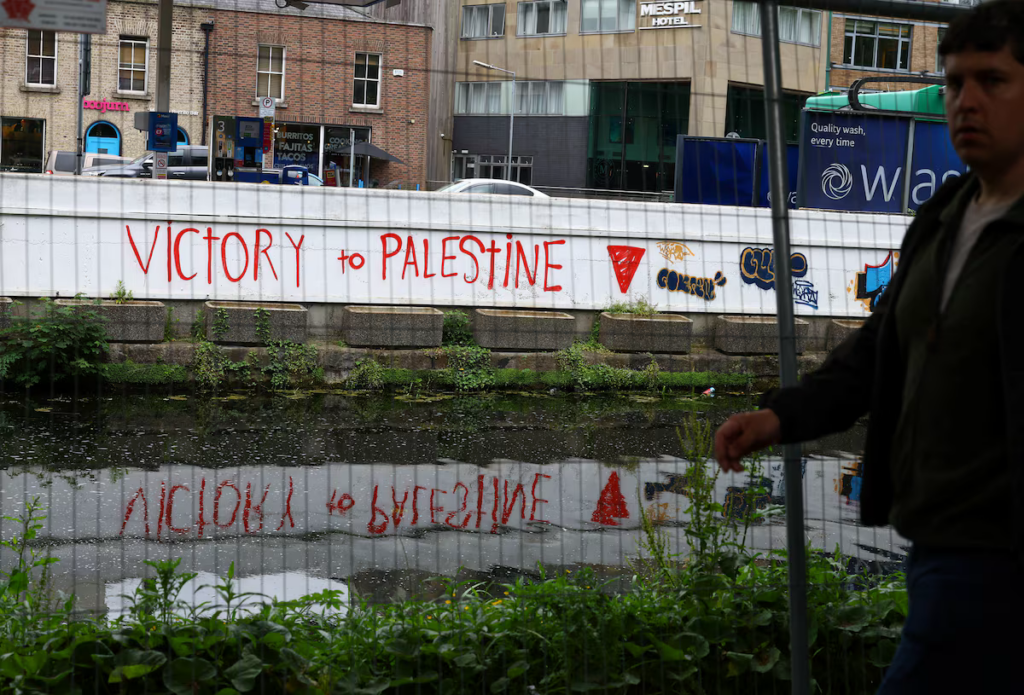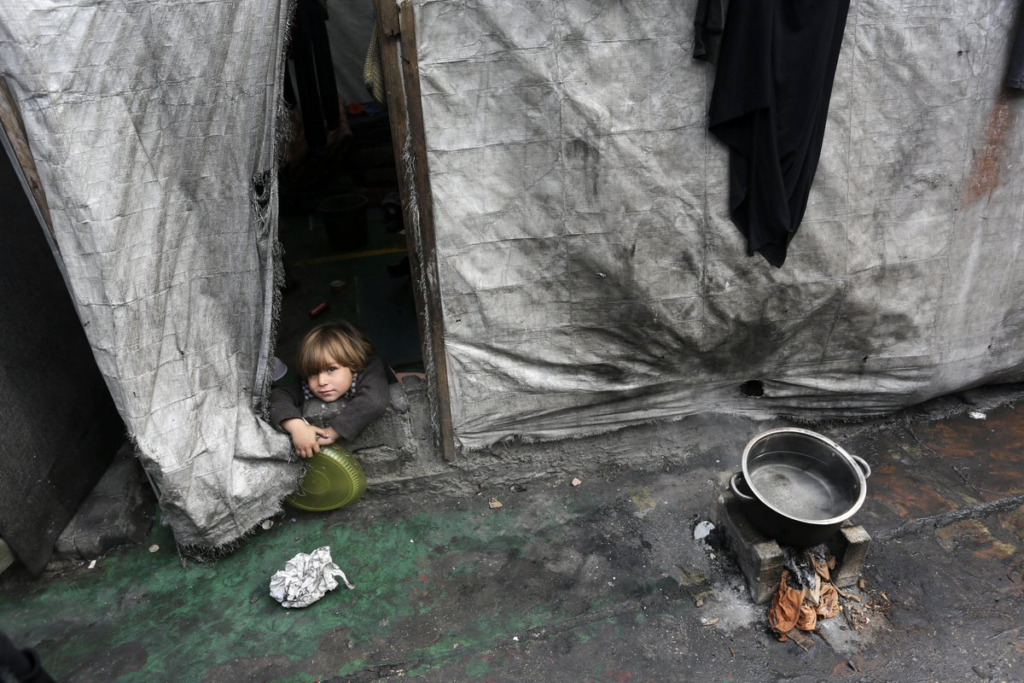Israel immediately recalled its ambassadors to Oslo and Dublin and said it would do the same for Madrid in protest against what it called a “distorted step.”
Three European nations announced Wednesday they will formally recognize a Palestinian state, a landmark move that drew a swift rebuke from Israel and praise from Palestinians.
The announcements from Ireland, Norway, and Spain dealt the latest diplomatic blow to Israel, as the United States’ close ally faces mounting international isolation and backlash over its deadly military offensive in the Gaza Strip.

A man walks past graffiti reading ‘Victory to Palestine’ after Ireland has announced it will recognise a Palestinian state, in Dublin, Ireland, May 22, 2024. REUTERS/Hannah McKay
Foreign Minister Israel Katz said he had immediately recalled Israel’s ambassadors to Oslo, Dublin, and Madrid and ordered a “severe Démarche” to the three countries’ envoys in Israel.
The formal recognition will take place May 28, and may be followed by other European countries as outrage over Israel’s actions in Gaza bolsters the Palestinian cause on the global stage and adds to pressure on Israel to engage in talks for a path toward a two-state solution to the decadeslong conflict.

The United Nations Agency for Palestinian Refugees, warned Monday it had to suspend food distribution in the southern city of Rafah, where more than 1 million people sought refuge during the war
It comes amid a spiraling humanitarian crisis in Gaza. UNRWA, the United Nations Agency for Palestinian Refugees, warned Monday it had to suspend food distribution in the southern city of Rafah, where more than 1 million people sought refuge during the war, citing a lack of supplies and safety issues given the Israeli military’s expanding operation in the area.
“In the midst of a war, with tens of thousands killed and injured, we must keep alive the only alternative that offers a political solution for Israelis and Palestinians alike,” Norwegian Prime Minister Jonas Gahr Støre said as his country led the triple announcement.
“Two states, living side by side, in peace and security.”
Speaking at a news conference in Dublin shortly after, Irish Prime Minister Simon Harris said he hoped the decision would “offer hope and encouragement to the people of Palestine at one of their darkest hours.”
“This recognition is not against anyone, it is not against the Israeli people,” Spanish Prime Minister Pedro Sánchez said in an address to Parliament. “It is an act in favor of peace, justice and moral consistency.”
But Israel saw it differently.
“Ireland and Norway intend to send a message today to the Palestinians and the whole world: terrorism pays,” Israeli Foreign Minister Israel Katz said. He said that the recognition could impede efforts to return Israeli hostages being held in Gaza and makes a cease-fire less likely by “rewarding the jihadists of Hamas and Iran.”
In a later statement, he said the ambassadors of Spain, Ireland and Norway would be expected to “watch a video of the brutal and cruel kidnapping of our daughters by Hamas terrorists, to emphasize the distorted decision their governments have made.”
It comes as the Israeli military continues to expand its operations in both southern and northern Gaza, where more than 35,000 people have been killed in seven months of war, according to local health officials.
It also comes after the International Criminal Court’s chief prosecutor announced he would be seeking arrest warrants for Israeli Prime Minister Benjamin Netanyahu and Israeli Defense Minister Yoav Gallant, along with Hamas leader Yahya Sinwar and others for alleged war crimes in the Israel-Hamas war.
‘The right side of history’
Palestinian Authority President Mahmoud Abbas welcomed the development and urged other countries to follow suit.
In a statement carried by the official Wafa news agency, he said the decision will enshrine “the Palestinian people’s right to self-determination” and support efforts to bring about a two-state solution with Israel.
Hamas welcomed the announcements as “an important step on the path to establishing our right to our land” and urged others to follow. The head of the Arab League called it “a courageous step” that puts the three European countries “on the right side of history in this conflict.”
Ireland and Spain had in recent weeks signaled they would recognize Palestinian statehood, with Sánchez touring the continent and the Middle East to garner support for the move.
Harris said during the news conference in Ireland that he believes Israel “loses nothing” in the recognition of Palestinian statehood. “We must be on the right side of history,” he added.
Ireland has long expressed empathy for the Palestinian cause, with many seeing their republic’s own history fighting for independence under British rule reflected in the Palestinian cause.
Israel publicly cautioned against recognition, as well as any fresh push for a two-state solution following the Hamas-led Oct. 7 attacks.
Prior to Wednesday, more than 140 of the 193 member states of the U.N. recognized Palestinian statehood, with no Group of Seven nations among them.
The Biden administration was drawing up options to enact the policy after Israel’s current war in Gaza, a senior administration official told NBC News earlier this year, but there has been no public indication of such a step from Washington since then.
In a statement Wednesday, National Security Council spokesperson Adrienne Watson said “The President is a strong supporter of a two-state solution and has been throughout his career. He believes a Palestinian state should be realized through direct negotiations between the parties, not through unilateral recognition.”
The two-state solution has its roots in the historic Camp David Accords in 1978 between Israel and Egypt, which were enshrined in U.N. resolutions and later accepted by both Israel and the Palestinians in the Oslo Accords that mapped out a route to peace but ultimately failed.
Under Netanyahu, a two-state solution has appeared increasingly unlikely — and in the wake of Hamas’ Oct. 7 attacks, in which some 1,200 people were killed and around 250 others taken hostage, the Israeli leader has unequivocally rejected any future state for Palestinians.
The move, he has said, would effectively be rewarding Hamas for its actions on Oct. 7.
In an interview with MSNBC’s Stephanie Ruhle on Tuesday, Netanyahu appeared to strike a slightly more conciliatory tone, saying he believed that “the expansion of peace is possible” but only if Hamas’ presence can be eliminated in the enclave and with the rise of alternative governance.
Israel has maintained that it must carry out a military assault in Rafah in order to succeed in eliminating Hamas.
But the U.S. has warned that even a full-scale ground assault on the city, which Israel once declared a safe zone, would not achieve that goal, with recent fighting in parts of northern Gaza highlighting Hamas’ resurgence in parts of the enclave the Israeli military previously said it had cleared of the militant group’s presence.
Despite mounting frustrations over Israel’s handling of its offensive in Gaza, Biden swiftly denounced the ICC’s chief prosecutor’s bid to seek arrest warrants for Netanyahu and other Israeli officials as “outrageous” as he suggested the announcement suggested a false “equivalence” between Israel and Hamas.
CNBC


Leave a Reply
You must be logged in to post a comment.